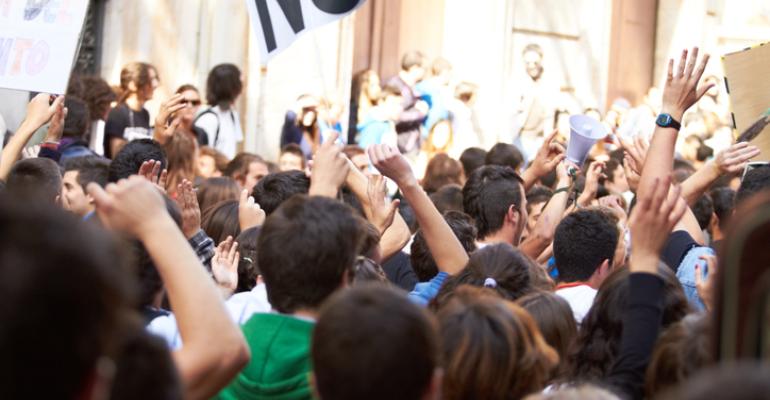The 22nd annual Global Conference for Israel, a 2,500-person event that was scheduled a year in advance to take place from November 30 to December 3 at the Colorado Convention Center, is facing significant resistance from a pro-Palestinian group that has planned continuous protest actions throughout the event and even before it begins, according to this article in the Denver Post.
The protest group, Colorado Palestine Coalition, has also tried to get registered participants to back out, using social media to say that “genocide apologists” are “not welcome” in Denver. The group even interrupted the Colorado legislature’s special session on property taxes on November 18, according to the Post article.
Colorado Governor Jared Polis is scheduled to speak at the conference on November 30. The Denver Police Department said in a statement that it was “working with the organizers to ensure a safe event. ... The department will provide additional resources to enhance security surrounding the conference. For safety reasons, we will not share specific numbers or planning strategies.”
Preventing a Combustible Environment
With such a high-profile conference contending with elevated tension from protestors, it’s possible that business events in energy, finance, technology, food manufacturing, and many other industries could face tactics and situations they’ve never dealt with before that come from groups opposing their work: widely-shared social-media attacks, drones dropping leaflets or other items from above, attendee-imposters gaining event entry, and others.
Especially with 2024 being an election year, this study showing that political violence has become more mainstream is something else that planners must factor into their work.
Alan Kleinfeld, CMP, CMM, CGMP, a former law-enforcement official who is a 15-year veteran in event-security consulting, told MeetingsNet that the host of a meeting that might draw protestors should “monitor what the opposition is saying on social media so you can work with the police and the host venue to keep protest actions from affecting the event or attendees. You also do this so you can counter the protestors’ message with relevant facts that you present to attendees and the general public in that city ahead of the meeting.” In fact, communicating with attendees is one of the most important things a planning team can do to mitigate negative effects of a protest on the event. “There are two goals with your messaging: First, showing attendees you are on top of the situation and that they have no reason to worry about their safety or to second-guess their attendance, especially when the facts show that the protestors’ messages are not [fully] accurate,” said Kleinfeld (in photo). “Second, persuading attendees not to engage or take matters into their own hands if they encounter protestors.”
In fact, communicating with attendees is one of the most important things a planning team can do to mitigate negative effects of a protest on the event. “There are two goals with your messaging: First, showing attendees you are on top of the situation and that they have no reason to worry about their safety or to second-guess their attendance, especially when the facts show that the protestors’ messages are not [fully] accurate,” said Kleinfeld (in photo). “Second, persuading attendees not to engage or take matters into their own hands if they encounter protestors.”
Another tactic planners could employ is to engage protest groups directly in the hopes of creating opportunities for civil dialogue rather than confrontation during the meeting. “Ask them if they truly want to have a discussion of all the relevant facts and perspectives,” Kleinfeld said. “Tell them, ‘You are free to state your case for our audience and we can go back and forth on the important issues.’”
However, Kleinfeld warned that for groups that might want to try this at the meeting itself, “make sure you get the right people at the table—you’ve got to do some serious vetting while also planning for security elements that can quickly stop any actions that go beyond a conversation.”
A couple of alternatives for engaging the opposition: Do it away from the host venue or do it a few days ahead of the meeting, while recording it for public viewing.
In the end, said Kleinfeld, “you’re trying to dial things down enough so that even if you get protests, it’s not confrontational. You can live with that. You just don’t want your event disrupted by a crowd of people laying down in your lobby and then you need the police to remove them.”
For more advice on minimizing confrontation with protest groups, read this MeetingsNet article.





